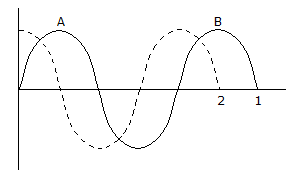Discussion
Home ‣ Civil Engineering ‣ Elements of Remote Sensing See What Others Are Saying!
- Question
The phase difference of the waves 1 and 2 at A in the given figure is :

Options- A. ?/4
- B. ?/2
- C. ?
- D. 3?/2
- Correct Answer
- ?/2
- 1. In a BOD test using 5% dilution of the sample (15 ML of sample and 285 mL of dilution water), dissolved oxygen values for the sample and dilution water blank bottles after five days incubation at 20°C were 3.80 and 8.80 mg/L. respectively. Dissolved oxygen originally present in the undiluted sample was 0.80 mg/L. The 5-day 20°C BOD of the sample is
Options- A. 116 mg/L
- B. 108 mg/L
- C. 100 mg/L
- D. 92 Mg/L Discuss
- 2. If the shear force at a section of beam under bending is equal to zero then the bending moment at the section is
Options- A. zero
- B. maximum
- C. minimum
- D. minimum or maximum Discuss
- 3. Water to the consumers may be supplied from
Options- A. infiltration galleries connected to sump well
- B. infiltration well dug out on the banks of rivers
- C. ranney wells sunk to the water level
- D. all the above. Discuss
- 4. The allowable stress in axial tension is generally kept less if thickness of the member is more than
Options- A. 10 mm
- B. 12 mm
- C. 15 mm
- D. 20 mm
- E. 22 mm Discuss
- 5. Pick up the correct statement from the following :
Options- A. in the earth's magnetic field, a magnetic needle rests in magnetic meridian
- B. the angle between the true meridian and the magnetic meridian is called magnetic variation
- C. one end of the magnetic needle supported at its centre of gravity tends to dip down towards the. nearer magnetic pole of the earth
- D. the magnet properly pivoted is balanced by means of riding weight movable along the needle
- E. all the above. Discuss
- 6. Which one of the following is used for preparing porcelain
Options- A. clay
- B. feldspar
- C. quartz
- D. minerals
- E. All of these. Discuss
- 7. Due to scan geometery of a satellite sensor:
Options- A. the off-nadir resolution is degraded
- B. the ground distance swept by the senor, IFOV is proportional to sec2?, where ? is the angle of scan measured from the nadir
- C. the details towards the edge of the scan get compressed
- D. All of these Discuss
- 8. Water content of a soil sample is the difference of the weight of the given sample at the given temperature and the weight determined after drying it for 24 hours at temperature ranging from
Options- A. 80° to 90°C
- B. 90° to 95°C
- C. 95° to 100°C
- D. 103° to 105°C
- E. 105° to 110°C Discuss
- 9. Workability improved by adding
Options- A. air-entraining agent
- B. foaming agent
- C. oily-agent
- D. aluminium compound
- E. all the above. Discuss
- 10. Bernard's distribution graph is a plot of time on X-axis and
Options- A. run off on the y-axis
- B. total run off on the y-axis
- C. percentage of total surface run off on y-axis
- D. percentage of total surface run off during uniform time intervals on y-axis
- E. none of these. Discuss
More questions
Correct Answer: 92 Mg/L
Correct Answer: maximum
Correct Answer: all the above.
Correct Answer: 20 mm
Correct Answer: all the above.
Correct Answer: All of these.
Correct Answer: All of these
Correct Answer: 105° to 110°C
Correct Answer: all the above.
Correct Answer: percentage of total surface run off during uniform time intervals on y-axis
Comments
There are no comments.More in Civil Engineering:
Programming
Copyright ©CuriousTab. All rights reserved.
